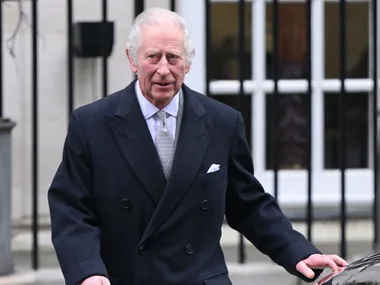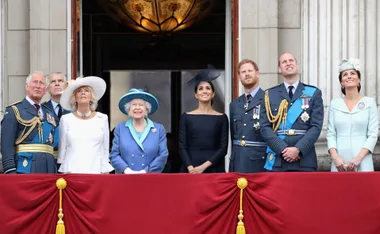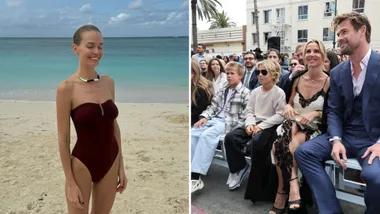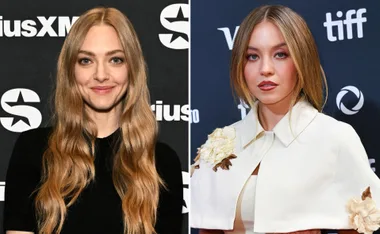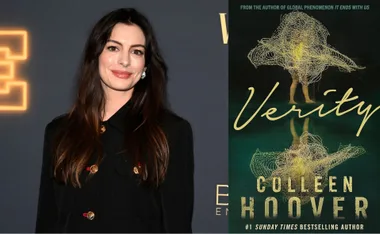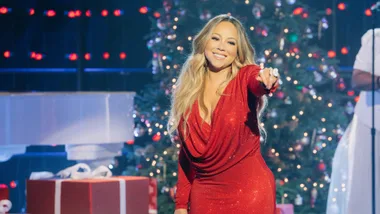Louise Limerick is author of Dying For Cake (Pan Macmillan Australia), the Great Read in the May issue of The Australian Women’s Weekly. Q You must be thrilled to be having your first book published? A I am – I can’t really believe it is happening. Q I believe your manuscript was picked out of the ‘slush’ pile, so it was a stroke of luck someone read it and you got published? A Someone at Pan Macmillan was telling me they get about a thousand a year. And they take on less than 10. I went about getting published all the wrong way. I had no agent. An unsolicited manuscript and no history of previous publication or of winning any writing prizes or anything like that. Q You are an inspiration then to others? A I hope so. I think it comes down to I always wanted to be a writer. And I always wanted to do this and when you finally get down and do what it is you really wanted to do, what gives you the most joy, then all sorts of possibilities open up to you. I’ve wanted to be a writer since I was a little girl. I wrote my first story at age five and I can remember taking it to school and reading it out to the class. Then when I was about 11 I went through a stage of climbing up onto the pergola roof that was above our courtyard and I’d sit up there and write stories. And poems, where no-one could disturb me. Q Anyone involved in your family in publishing or writing? A No, my eldest sister – I’m the youngest of five children and there’s 18 years difference between my eldest sister and myself – loves reading and she would always give me books for my birthday and Xmas. So she gave me classic books from an early age – Little Women, Seven Little Australians and things like that and I just loved reading and it made me want to tell a story too, one day. I also had a desire to express myself. Because there was such a gap between the other siblings and myself, I was also a bit lonely and I wanted to talk to somebody so I’d write stories and talk to myself. Also, there was an elderly lady who lived next door to us when I was little. She taught me to sing on the piano and also told me lots of stories and would make up stories and we would sit outside on her patio and watch the people going up and down the street and she’d make up stories about them and I would join in that game. She taught me the art of story telling and helped me to live in my imagination. Her name was Dorothy Youlton and I used to call her Aunty Dorrie. She was a wonderful person – she had false teeth and she could click them like a horse. Q After all that you became a teacher and not a writer? A I fell into teaching, I started off in journalism. I did a journalism course but it wasn’t for me because I’m hopeless at spelling and punctuation. And I think my book is written in a very spare style. The editor commented there weren’t many commas and things in my writing – I thought to myself, ‘I actually don’t know how to use them very well!’ (laughing). I kept losing marks for that and I’d go in with a wonderful story and come out with five out of ten. Or less. So then I did Arts, Literature, Psychology, Australian Social History… Q Where at? A University of Queensland and I had a great time. I got a Bachelor of Arts, then Diploma of Education and I’ve also got a Masters of Education in guidance and education. I fell it not teaching and thought maybe I could teach kids how to write and share my love of reading and writing. That was true to an extent but teaching just wasn’t for me. What I really wanted to do was write my own books. The school I was sent too initially was quite a difficult school. Was it a tough school? Yes, it was a poorer school and I had lots of illiterate kids in my class so there was lots of different needs to cater for and I found myself very stretched and by the end of that year I thought ‘I’ll escape and have a baby and then I’ll have time to write.’ But of course that wasn’t really true (laughing). Q What kind of teacher were you? A A secondary high school teacher in English and history and I got married in 1992 – just after I finished university. And then had a baby – my first child – when I was 24. So I was reasonably young. Q And then you had two more? A Yes, Ellen is 8, Peter is 6 and Katie is 14 months old. Q What does your husband, Michael, do for a living? A He is a strategic policy adviser with the Department of Aboriginal and Islander Affairs. He’s a lawyer. Q Writing never happened with the new baby, did it? A No, I thought I’d write while she was sleeping but she didn’t sleep so I had a screaming baby and well, anyway, I gave up my writing for a while and then within 3 years I had another baby and then, after Peter was born I’d just fallen into that whole mothering thing. That was fine but, there was still something I wanted to do just for myself. Michael was very kind, he said I know you’re going crazy just looking after the kids all the time, so you have Saturday morning and I’ll take the kids away. I’ll do something with them and we’ll spend the time together and you do what you want to do. I decided to write. Dying For Cake, the first draft of it was written in nine months of Saturday mornings. So every Saturday morning I’d sit down at my computer and I’d write another chapter. I came up with the title first. I thought, Dying For Cake, that sounds like a really good title. Q That was before you had a plot? A Yes, I thought it expresses the desire to have something more. And I guess that was what I was feeling myself. I came up with the title and then I came up with the first line. I thought, ‘okay.’ Then I wrote the first six chapters and thought, ‘oh, it might be going somewhere.’ So then I decided to draw up a plan, because being an English teacher I knew I had to have a plan, and a climax and resolution. So I gave myself a bit more structure and proceeded to write through to the end. I thought it was finished when I sent it away, but Cate Patterson At Pan Macmillan thought it there was a little bit more to do. She was very kind and willing to take a punt on what was really only half a book, because she loved the book. Before I got a chance to finish it too, I’d become pregnant again with my third baby, and when I’m pregnant I’m so sick all the time I find it very hard to sit down at the computer for long periods, so I got to the climax and basically the book had no resolution and I’d written the last chapter. Q What was your reaction when you received the phone call accepting your book for publication? A I was shaking. Very, very excited. It was a funny thing, in a way I knew she was going to call. Because they’d had the book for six weeks. First I sent them my first six chapters, an outline of the story and a proposal and then they asked for another three chapters. Then they asked for the whole thing, so It was a bit of too-ing and fro-ing and I knew I was gradually going up the ladder. Finally I was actually dealing with the fiction publisher, who is Cate and I thought then, I might be okay. But I hadn’t heard from them in a while. I’d had my baby, she was about 12 weeks old. And I was waiting and I kept checking the post and the answering machine, hoping. I knew it was silly. I kept telling myself ‘why are you doing this to yourself?’ Most people write ten manuscripts before they get published. So…but one day I was really anxious about it and I thought ‘no, I’ll stay at my son’s pre-school and do things around there.’ I stayed longer and longer at pre-school and finally when I got home I listened to the answering machine and Cate’s voice was there saying that she wanted to talk to me about my book. I was shaking and I was too frightened to ring her back, but I did and she told me that she loved my book and wanted to know was if I was going to write any more and would I be open to editing. ‘Yes, of course!” I said. She said she had to go to a meeting where they’d decide whether or not to take my book. I got off the phone and I thought, well, I still don’t really know. I think there was another week of waiting after that. And then it all fell into place. Also she told me I perhaps should get an agent. Funnily enough I had sent my manuscript to the very agent she suggested. She hadn’t got back to me then, but she after that she did, so now I have an agent. The other thing that happened was the night before that phone call I’d been flicking through a book thinking I’ll have to send my book to someone else and I have a big book which has all the publishers in Australia and it had a little excerpt in it by Matthew Reilly who Pan Macmillan also publishes, saying what a great publisher Cate Patterson was and how she’d taken him on. I said to Michael ‘look, this is the person who’s reading my book!’ Q Did you celebrate? A Yes Michael and I went out for dinner, he came home early and he was very, very excited. It’s been his baby too in a way because he’s given me the time to do it and that was what I really needed. Q What gave you the idea to base the story around a group of women who met over coffee every week? A Because it’s something I do, meet other mums over coffee. Locally we have a little café where all the mums seem to end up and if you’ve got small children you drag them along too and you sit down and have a chat. It’s a neutral place and nobody’s home is getting destroyed by the toddlers. It’s just something I do and I thought ‘well, that’s what other women do too.’ And I thought it would be interesting to tell the story from a few different perspectives – I thought, how can I do that? Maybe if they’re all sitting down speaking to you as if you’re having coffee with them, that might be quite nice. I liked writing from each of the perspectives of the women because I found that once I gave them a voice they started to have a life of their own. Q The importance of female friends was central to the book? A Yes, I think women are always here for each other during the day. Also, during the day when we are here with the kids, our husbands are working. And so they come home at 6, 7 o’clock and we might spend a few hours with them, but they’re tired, we’re tired. And I think often the people we speak to about our problems are other women. Because they understand what we’re going through – and they’re there! I think what most people really need is just a good friend. Someone who will listen to them and be there because I think life at home with small children can be lonely. Q The other thing that happens in your book is how a good friend can betray you, too? A (laughing) Oh yes, that character – it was funny because I didn’t intend for her to betray her friend, I just started writing that chapter and I thought, ‘what’s going to happen?” And I thought ‘oh! Yes! They’re going to have an affair (laughing.’ It was unplanned. I think after a while a character takes on its own personality and they seem to direct the plot just as much as you. Q I liked the fact that the women made mistakes, it made the book more accessible and human and meant that their personalities resonated? A I didn’t want to ever create perfect people – and I didn’t want to make them horrible, because they would lose their integrity then. And they would just be stereo-types. Q I liked the way your story shows that not every woman is cracked up to be the perfect mother? A I think that’s true. I didn’t want to denigrate the choices that women make in any way – whatever they choose to do, if they choose to be a mother and they enjoy that, that’s wonderful because it’s a really wonderful thing to do. But if they make other choices for the sake of their happiness then that’s okay too. Because you’ve got to live as the person you are, you can’t try and be what society expects you to be or what you expect yourself to be. Q It was interesting that the archetypal earth-mother in the book, Joanna, is a bit judgemental? A She is, but she comes around at the end. I like her character because I think she grows a lot, becomes a lot stronger. And feels a lot better about herself because she’s enjoying doing something that the other women are not always enjoying or are having difficulty doing. So I think she emerges as quite a strong in the end and also, at the end there’s some sort of sense that she’s taking one of the other characters under her wing. And becoming a friend again. Q What made you use the device of the missing baby in the plot ? A I’d been thinking about post-natal depression and post-natal psychosis and including that in my book because I thought it was important to betray how someone can get very depressed after they have a baby. Things aren’t all perfect and it’s very difficult to be alone with a baby 24 hours a day. Women in that situation often think they can’t look after the baby. Q id you have a friend suffer from PND? A I’ve known people who have had post-natal depression. Yeah. And I think I’ve experienced depression and I’ve experienced elation after having children so I can understand all the different emotions people go through when they’re mothers. Q I also liked Joanna’s pre-occupation with weight and losing it? A When I was writing the book I was going to Weight-watchers. It was after I had my son and I put on a lot of weight and I needed to lose 10 kgs. So that found it’s way into the writing and I love baking cakes. My son has a peanut allergy and so he can’t eat things from bakeries and I have to do a lot of cooking anyway and I just love it and I just love to eat it. There’s nothing better I like than a cup of tea, a piece of cake and a good book. But I’ve learned that you cannot eat cakes 24 hours a day. I was a bit of a cake addict, but now I’m a social cake eater. I never eat cake alone. Q You lost the weight? A Yes, and then I had another baby and put it back on, but I’ve lost most of it now. Q What’s your favourite cake? A A pumpkin syrup cake and it’s in The Women’s Weekly Best Cakes and Slices. I love that cake. It’s delicious! Q Tell me about the books and authors you like? A The book I read most recently that I really liked was Unless by Carol Shields. It was lovely, so beautifully written and so effortless to read. And I’ve just read The Hours. I started I’m A Believer by Jessica Adams. My favourite book of all time is To Kill A Mockingbird by Harper Lee Collins and I love Little Women, Gone With The Wind, Rebecca and I love The Shipping News by Annie Proux and Tim Winton’s Cloudstreet. Q Your star sign? A Aquarius. Q How old are you? I’ve just turned 33. I was born in 1970. Q Louise believes? A In the resilience of women. Q Loves? A Family. Q Wishes? A Apart from world peace – that everybody could find joy or their heart’s desire? Q Who first read your manuscript? A Michael. Q Because he was there or because you trust his opinion? A (laughing) I think he was desperate to know if he was in it, actually. Was I giving away too many personal secrets? I think he wanted power of veto. Q Before you attended University of Queensland where were you educated? A Gap State High School. Q You must feel proud of what you’ve accomplished? A This is so amazing, it’s succeeded way beyond my wildest dreams, this little book! Q Why call it a ‘little book?” A Because it wasn’t as if I sat down and said ‘oh, I’m going to write a really great book.’ I just thought I’d write and see what happens. And it got published and all these wonderful things keep happening. It’s just amazing. I feel like I’ve got a guardian angel or something. I’ve started my 2nd book, I’ve got my title, but I’m not saying what it is. I couldn’t write it – completed three chapters and then threw them away and I thought ‘what’s wrong with this?’ Then I thought, ‘I don’t have the title.’ Q That’s the reverse of the way most writers do it? A I think I need a theme , I need something to write about. The title’s like a feed and everything else forms around that. I hope to get it done – it’s going to be a busy year for me. It’s all new to me, too. This is the first time I’ve been interviewed in my life.
Q&a: Louise Limerick
Louise Limerick is author of Dying For Cake (Pan Macmillan Australia), the Great Read in the May issue of The Australian Women’s Weekly.


